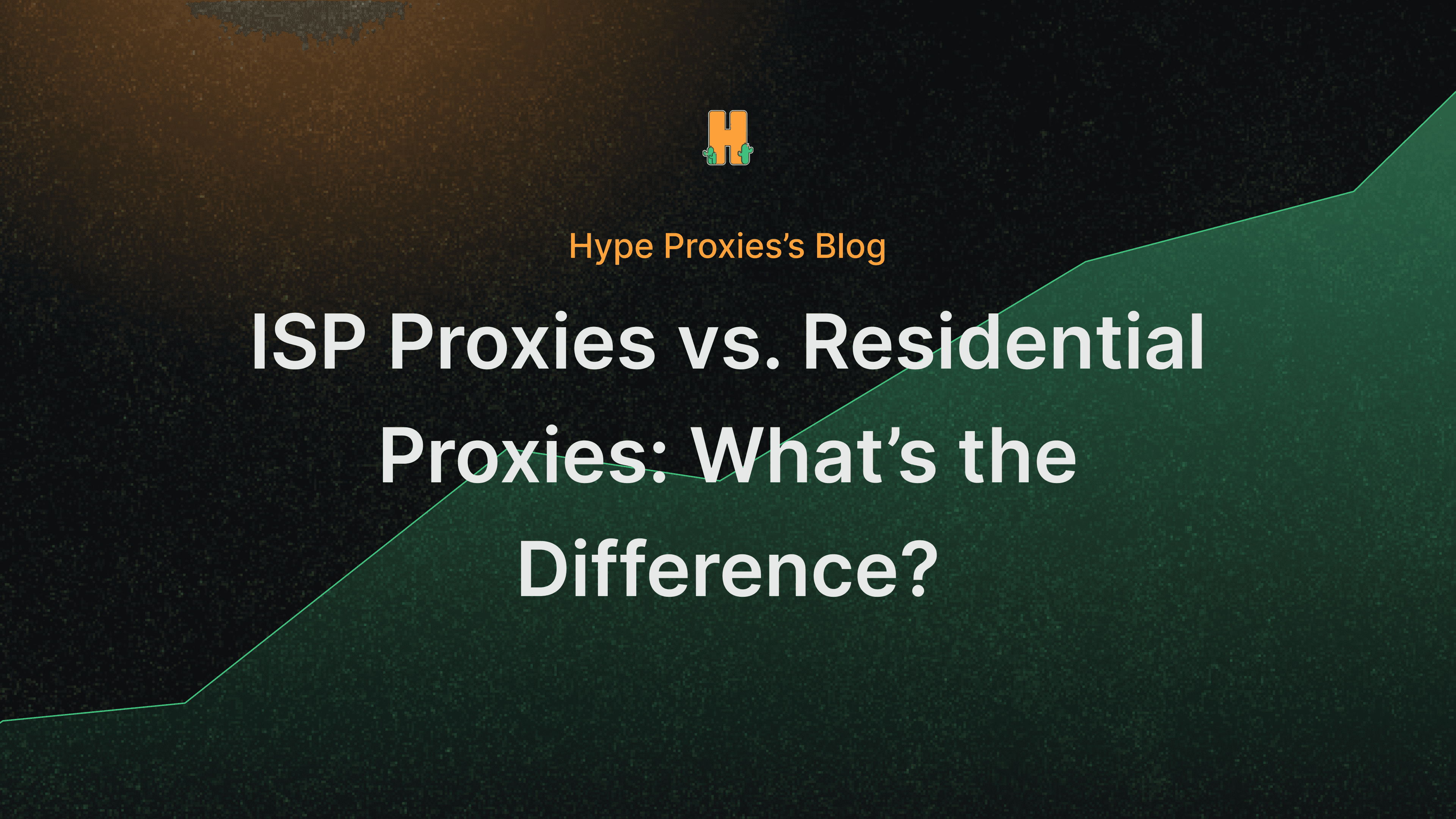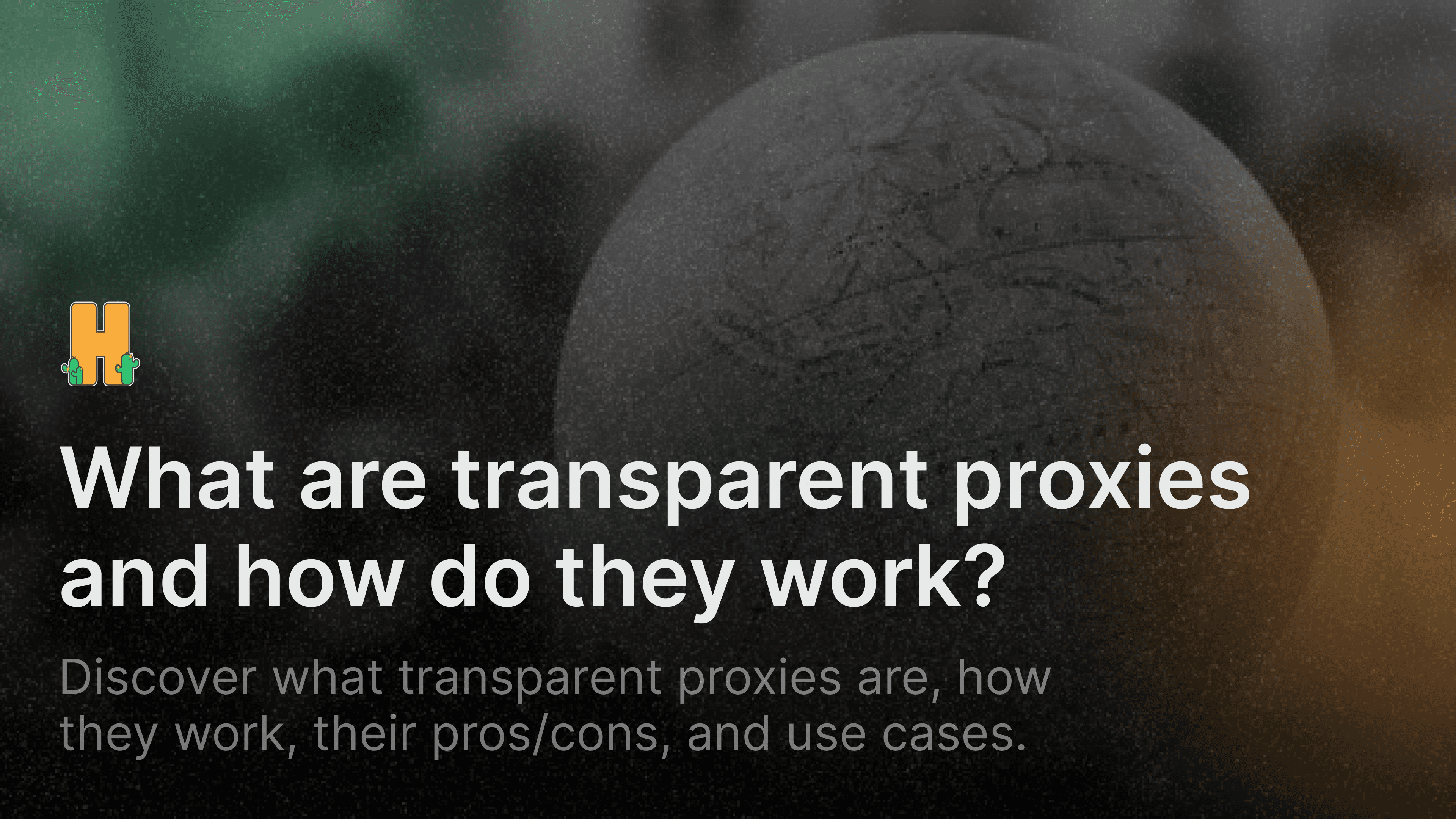Datacenter vs. residential proxies: complete comparison [2025]
Read this complete comparison between datacenter and residential proxies to better understand their pros, cons, common use cases, and much more!

Hype Proxies
Last updated -
Jan 9, 2025
Proxies
Are you confused about the differences between datacenter and residential proxies? Trust us; you are not alone.
While both serve the same purpose, they function in slightly different ways. Datacenter proxies originate from large corporate server farms, whereas residential proxies rely on IPs from real home internet connections.
If that still sounds a bit unclear, don't worry—we'll break it all down step by step in this article. More specifically, here's what we'll cover:
A clear explanation of datacenter and residential proxies
The pros and cons of each
Common use cases
A handy buyer’s guide to help you pick the right proxy type for your needs
Interested? Let’s get started!
What are datacenter proxies?
Datacenter proxies come from large facilities called data centers that contain rows upon rows of powerful servers. Companies like Amazon, Microsoft, and Google operate enormous data centers around the world to host all kinds of websites, apps, and online services.
Within these buildings, you'll find clusters (aka groups) of computer servers leased by proxy service providers. They install proxy server software onto those machines to assign IP addresses that customers can use to browse the web more anonymously.
So when you connect through a datacenter proxy, instead of websites seeing your real residential IP address (the one assigned to your house), they'll see the IP address of that proxy server hosted in the data center. This masks your true location and identity.
Datacenter proxies allow you to access geo-restricted content, scrape publicly available websites, gather data in large volumes, and more - all without (easily) getting detected.
They form the backbone of many web data extraction and web analytics efforts in academia, journalism, business intelligence, and other fields (they are much more popular than one might think!).
Advantages & disadvantages of datacenter proxies
Now that you have a general idea of datacenter proxies are, let’s look at some key pros and cons of using them.
Advantages
Cost efficiency
Maintaining thousands of consistently high-performing servers in one centralized facility allows data center operators to benefit from significant cost savings through economies of scale.
These savings come from aspects like renting real estate, cooling systems, server hardware, and network bandwidth in bulk at more favorable rates.
Such optimized infrastructure and operating costs mean datacenter proxy providers can offer affordable packages compared to maintaining a distributed global residential network.
Speed and reliability
Data centers actively choose locations with access to tier-1 internet backbone connections, reliable energy grids, and ultra-fast fiber networks (basically the best technology you can find).
This results in very high-speed datacenter proxies capable of rapid data transfers with minimal latency.
Their dedicated proxy servers also avoid the unpredictability of residential network stability. This makes datacenter proxies highly reliable for consistently fast performance when extracting, copying, or scraping thousands of files or web pages quickly.
Availability and scalability
Leading data center operators maintain sufficient buffer server capacity, allowing them to deploy new proxy servers instantly and within minutes by loading the required software.
In other words, they never get dangerously close to full capacity to easily handle sudden spikes in customer demand.
Simplicity and ease of setup
With no need to coordinate complex residential IP allocation across disparate consumer devices, datacenter proxies are straightforward for providers to deploy and manage. Their centralized nature also simplifies things for customers.
Because of their ease of use, developers and scraper operators often prefer datacenter proxies over managing residential proxies distributed across multiple regions and carriers - especially for internal tools or basic projects.
Anonymity for basic needs
While datacenter proxies do not provide the same elite levels of anonymity as residential proxies, their IP addresses still offer sufficient separation from your real location or identity during casual browsing sessions and low-sensitivity web scraping tasks.

Disadvantages
Detection and blocking risks
Websites can identify datacenter proxies based on their known source data center locations and IP address patterns. Sophisticated bot and scraper detection systems can easily recognize these proxies and may instantly block them (no bueno!).
So if you attempt to scrape or crawl sensitive data from websites like Facebook, Amazon, or online newspapers with strict anti-scraper mechanisms, datacenter proxies will likely get banned very quickly.
One caveat is that not everyone can afford the same sophisticated structure(s) as these industry giants, so the rule is not universal.
Risk of blacklisting
With shared datacenter proxies, if the proxy provider oversells their network capacity, you may suddenly find your proxies blocked if another customer triggers bans through abusive (excessive or illegal) scraping before you.
Such unreliable uptime can severely disrupt operations - especially live production systems. Sudden blacklisting requires rapidly switching datacenter proxy sources mid-project.
Limited geographical coverage
While datacenter proxies can provide IPs from various countries and regions, they cannot match the vast granular location targeting range offered by residential proxies.
Datacenter proxies are confined to the countries and cities where major data center hubs exist. So they lack residential proxy capabilities for precise state-level or city-level targeting required in applications like localized SEO ranking analysis.
Ethical and transparency issues
Datacenter proxies are not organically linked to real residential individuals. Some providers are vague about their exact data center sources. This raises concerns about transparency and ethical unease for certain applications.
Lower success rates [in some cases]
For applications requiring high behavioral authenticity - like social media marketing, qualitative market research, and evading bot detection during specialized web scraping - data center proxies have significantly lower success rates than residential proxies.
In other words, they fail to mimic real human users as effectively - which can trigger a form of spam protection and make the operation fail.
Common use cases for datacenter proxies
Datacenter proxies are the economical choice for moderate anonymity needs, public data access at scale, and lightweight geo-targeting. Let's explore some popular applications:
Rapid data extraction
As we mentioned, datacenter proxies are designed for speed and efficiency, making them ideal for quickly scraping publicly available information from websites with basic bot protection. If you need to scrape thousands of pages in a short time, these proxies are a great choice.
Accessing geo-restricted content
Certain streaming platforms and social networks restrict content based on the viewer's location (or maybe that show you want to watch is just not available in your language).
By using datacenter proxies from other countries, you can bypass these restrictions and access region-locked content from abroad.
Everyday browsing privacy
While they cannot guarantee full anonymity, datacenter proxies do add a layer of separation between your device and the websites you casually browse. By hiding your actual location and IP they offer sufficient privacy for low-sensitivity activities.
App testing across regions
Application developers can leverage datacenter proxies to evaluate how their product's user experience, features, and performance vary across geographic regions during beta testing and QA.
Informed market research
Public databases contain troves of lightly restricted market and consumer data that can inform key business decisions. Datacenter proxies allow discreet access without revealing company identity or intentions during the research phase.
Under-the-radar SEO monitoring
Search engine optimization experts can track keyword rankings and website visibility across different areas using datacenter proxies instead of their company IP addresses to avoid detection during competitive analysis.

What are residential proxies?
Residential proxies offer top-level anonymity by using real IP addresses provided by Internet Service Providers (ISPs) for everyday household internet connections.
When you browse the web from your home Wi-Fi or mobile data, your IP address is visible to websites, acting as a unique identifier tied to your location. Residential proxy services tap into a large pool of these home and mobile IP addresses spread across different regions.
By routing your web traffic through these residential IPs, websites see you as a regular residential user, not as a proxy. This helps you access content smoothly without triggering bot detection or blocks.
Reputable residential proxy services obtain permission from device owners to use their internet addresses. In return, owners receive rewards or special apps. This ensures reliable internet access without the risk of sudden removals.
Advantages & disadvantages of residential proxies
Advantages
Extremely difficult to detect
Websites find it almost impossible to distinguish residential proxies from regular households browsing the web. Because of this, residential proxies make it really hard even for advanced bot protection systems to block them.
CONSIDERATIONS:
Sophisticated systems like CAPTCHA (reCAPTCHA) or behavior analysis (tracking mouse movements, IP velocity, or browsing patterns) can still detect unusual or non-human activity, even if the IP is residential. Websites like Amazon and Facebook, for instance, are known for implementing advanced techniques that can spot scraping attempts regardless of the type of IP address.
Access any location precisely
With home internet connections worldwide, residential proxies can precisely target virtually any country, city, metro area, or state. This makes them ideal for localized research, content testing, and executing geo-specific tasks.
Guaranteed uptime and availability
Top providers offer strong incentives to device owners to prevent sudden IP drops. Their reliable infrastructure ensures proxy uptime by quickly replacing any offline IPs, guaranteeing smooth and uninterrupted service.
Human-mimicking browsing patterns
Residential IPs automatically rotate to mimic human movement across locations. This technique, combined with random delays between requests, effectively makes the proxy look like the behaviour of a real user.
High success rates
For tasks that require perfect residential imitation, such as social media growth, localized SEO, and specialized scraping, residential proxies deliver superior results by bypassing most (see consideration above) anti-bot barriers.
Disadvantages
Overhead costs
Residential proxies tend to be slightly more expensive as there are also more costs involved for the provider. These include infrastructure costs, ethical compensations, and a few others.
Variable connection speeds
Since residential proxies rely on household devices, they may have slower or fluctuating speeds compared to dedicated (and more powerful) datacenter proxies. However, location targeting accuracy makes up for this limitation in most uses.
Dependence on end-user network stability
Sporadic internet outages on certain residential devices can temporarily reduce proxy availability until those IPs get removed from the pool through automated cycling procedures. [Though overall uptime remains high]
Common use cases for residential proxies
Residential proxies have special abilities that make them useful for particular tasks. Their anonymity and location targeting open up many specialized uses, including:
Accessing geo-restricted content
Residential proxies help bypass location-based restrictions on news, government resources, streaming content, and social networks by making it appear as if you are browsing from one of the allowed locations.
E-commerce experience testing
To provide smooth checkout experiences globally, e-commerce sites can use residential proxies to thoroughly test cart flows, payment integration, shipping calculations and personalized elements across different locations.
Localized SEO monitoring
SEO experts use residential proxies to see how client websites rank in different areas (both on the map pack and on organic results), giving them accurate local search results while staying anonymous.
Precise Ad verification
While a bit less common compared to the use cases above, residential proxies allow marketers to check ad campaigns in different locations and various devices, ensuring the ads are displayed correctly and haven’t been altered.
Discreet market intelligence
Another use case of residential proxies for marketers is to collect competitor data from global markets without being detected. Being able to precisely choose the location of the residential proxy allows them to check if competitors are running specific campaigns for specific areas.
Social media growth
Residential proxies can also help marketing teams and agencies manage multiple social media accounts for different regions, allowing them to post content specific to each region without restrictions.
Fraud detection research
By mimicking user behaviour from different regions, residential proxies help improve fraud detection systems, showing how geo-specific actions can trigger risk alerts.

Summary and buyer's guide
To conclude, residential proxies provide superior anonymity and location targeting accuracy, while datacenter proxies focus more on speed and affordability as their main strengths.
In general, choose residential proxies if:
You need very high, human-like anonymity that can evade most detection systems.
You require global geographic targeting with pinpoint accuracy down to a city or metro area.
You want excellent success rates at accessing restricted websites, even with strict bot detection or geo-blocking.
You need to handle sensitive applications like social media growth, localized SEO, and specialized web data scraping.
And choose datacenter proxies if:
You need moderate anonymity for basic websites and lower detection risk.
You only need country-level location targeting with limited precision.
You want fast website loading speeds and quick page rendering.
You need instant and flexible scalability for changing requirements.
You have a tight budget, as they are more affordable, especially for bulk purchases.
You are working on public data scraping at scale or basic browsing anonymity needs.
That’s it. We hope this breakdown helps you make an informative decision.
Thanks for reading!
Share on
No credit card required. Start your trial now
Looking for 25% off?
Subscribe to our newsletter to get a unique discount code and a free copy of our in-house proxy tester!
No spam. Unsubscribe at anytime.

![Datacenter vs. Residential Proxies: Complete Comparison [2025]](https://framerusercontent.com/images/jpXibxwyKrGOQrC6X7Vd3xabLjo.png)





![How to Get Unbanned from OnlyFans [2025]](https://framerusercontent.com/images/Q0UBYCLidx83aoNoryLgIl9CWs0.png)
